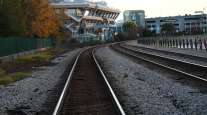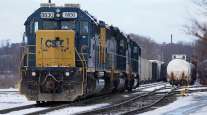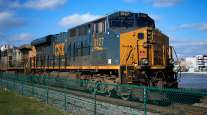Changes at CSX Bring Complaints and Slowdown

CSX’s efforts to streamline its operations have brought complaints from customers about deteriorating service. But the head of the railroad is blaming the problems on resistance to change within the company.
According to the federal Surface Transportation Board, the complaints include significantly slower and unpredictable transit times while loaded and empty cars sit idle for days. The problems have forced some shippers to reduce or stop production or find other transportation, it said.
Furthermore, equity research firm Cowen and Company reports that 80% of respondents to its survey have experienced service issues since Hunter Harrison took over as CSX president and CEO in March. Many have switched freight to Norfolk Southern railroad or to a trucker. Cowen also said the problems should be temporary.
RELATED: More layoffs at CSX brings total dismissals to 1,000, as originally projected
The Surface Transportation Board met with members of the railroad’s senior staff last week and then sent a letter to Harrison urging him to fix the problems.
On July 31, Harrison followed up with a letter to customers apologizing for the problems.
“The pace of change at CSX has been extremely rapid, and while most people at the company have embraced the new plan, unfortunately, a few have pushed back and continue to do so,” he wrote. “This resistance to change has resulted in some service disruptions. To those customers that have experienced such issues, we sincerely apologize. As we move forward, we will continue to address these internal personnel matters.”
Harrison’s move to CSX was highly publicized throughout the railroading and financial world. An industry veteran who has turned around several railroads, he is the leading proponent of what’s called precision railroading, with every piece working together like one continuous conveyor belt.
The railroad has taken nearly 900 locomotives and 60,000 freight cars out of service and laid off 2,300 people this year. And last month, Harrison that 700 more positions could be gone by the end of the year.
Meanwhile, trains are slowing and customers are complaining.
“The rail performance statistics indicate that CSX is currently far from precision railroading and in fact, is heading in the wrong direction,” said Larry Gross, a rail analyst with FTR Transportation Intelligence. “After a swift improvement in the weeks following Harrison’s assumption of command, the statistics have turned around and are heading in the wrong direction.
“Average train speeds have fallen for the past seven weeks straight from a recent peak of 22.5 mph to 19.2 mph in the most recent week. The average over the last four weeks is over 3% slower than the average performance of the company over the past 10 years and headed downward.”
RELATED: CSX shareholders approve $84 million payday to Harrison despite health concerns
Gross also pointed to the railroad’s own stats that show the average time cars spend idle in yards between trains, called yard dwell, has increased from 24 hours to 28 hours in the past four weeks.
“The trend is unfavorable and as yet shows no sign of turning,” he said.
CSX’s stock has fallen since the letter was released, from an opening July 27 of $52.09 to $48.60 at close of Aug. 1. But it’s still well above the $38.09 it was in mid-January was when word of Hunter’s interest in taking over the railroad first broke.
In its letter, the Surface Transportation Board asked CSX’s senior staff to begin weekly calls with its Rail Customer and Public Assistance staff to discuss the problems and the steps being taken to resolve them.
A spokesman for CSX said the first call happened July 31.
RELATED: Analysis - CSX profit chugs along, but could come at a price
“A wide range of subjects were discussed in detail and CSX is reviewing initiatives that will be responsive to the Board’s concerns, including efforts to provide more information about the rapid changes that CSX is implementing to improve the railroad’s customer service, safety and efficiency through precision scheduled railroading,” said spokesman Rob Doolittle.
Doolittle said he could not address the specific complaints about service.
Cowen and Company’s report, which came out July 31, included dozens of comments from CSX customers, most of them negative.
“It has been a dumpster fire,” said one. “I have had cars sit on my siding for weeks with no local service, I have had cars ping-pong back and forth between terminals, I have had cars sit in intermediate yards for weeks on end with no crews or power to move them. Dealing with the CSXT has become a frustrating process that at times, is not worth the effort.”
The report said that 40% of the firms Cowen and Company talked to have switched freight from CSX to Norfolk Southern and that two-thirds have switched freight to a trucker.
But its analysis did offer this promising note: “We also think CSX’s issues are transitory. While it is painful for many shippers today, we expect that over the next 12-18 months CSX customers will be more pleased with the rail’s service quality.”
Gross also suggested a wait-and-see approach.
“From my perspective it is simply too soon to tell whether this is the to-be-expected indigestion stemming from radical change or something more profound,” he said. “Certainly the pace of change at CSX is very fast, perhaps too fast for the organization to absorb. It may be that because of age/physical condition concerns, Hunter Harrison feels that he needs to drive as fast as possible to get things done within his available time window. Alternatively, this may just be his natural pace.”
Distributed by Tribune Content Agency, LLC




